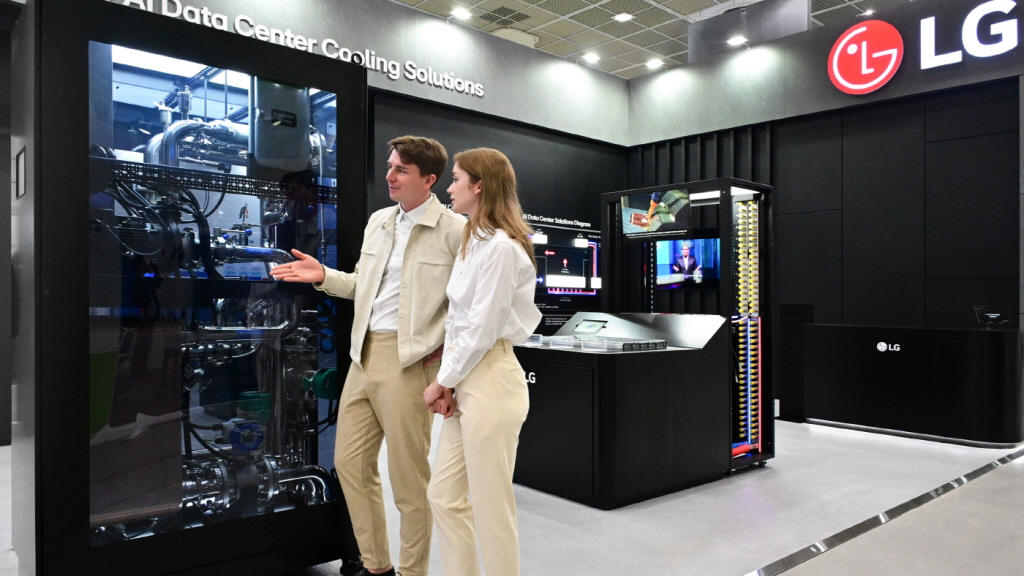LG전자(대표이사 조주완)가 HVAC(Heating, Ventilation and Air Conditioning, 냉난방공조) 기술력을 앞세워 열관리 솔루션 사업을 본격 확대한다. 특히 AI 시대를 맞아 급성장하는 데이터센터에 최적화된 액체냉각 사업에서 속도를 낸다.
공기냉각부터 액체냉각까지, 평택공장 테스트베드 구축
LG전자(대표이사 조주완)가 HVAC(Heating, Ventilation and Air Conditioning, 냉난방공조) 기술력을 앞세워 열관리 솔루션 사업을 본격 확대한다. 특히 AI 시대를 맞아 급성장하는 데이터센터에 최적화된 액체냉각 사업에서 속도를 낸다.
LG전자는 현지시간 14일부터 17일까지 미국 워싱턴 D.C에서 열리는 ‘데이터센터월드(DCW; Data Center World) 2025’에 처음 참가한다.
액체냉각 솔루션(CDU; Coolant Distribution Unit, 냉각수 분배 장치) 등 데이터센터 시장에서 HVAC 기술력을 기반으로 개발한 다양한 냉각 솔루션 라인업을 통해 준비된 플레이어로서의 입지를 다진다. DCW는 빅테크와 반도체 기업도 참여하는 전시회로 AI 기술과 트렌드, 인프라 구축, 에너지효율 등 다양한 주제의 세미나와 거래선 미팅이 열린다.
액체냉각 솔루션은 금속 재질의 냉각판(콜드 플레이트)을 서버 내 열 발생이 많은 CPU, GPU 등 칩에 직접 부착하고, 냉각수를 냉각판으로 보내 열을 식히는 방식이다. CPU와 GPU는 연산이 늘어날수록 발열량이 많아져 열을 효과적으로 관리하는 솔루션이 필수다. AI 데이터센터는 서버 랙 밀도가 높고 대량의 칩 사용으로 기존 데이터센터보다 더 많은 열을 발생시킨다. 칩을 직접 냉각하는 방식은 공기냉각 방식에 비해 설치 공간이 작고, 에너지 효율이 높아 차세대 기술로 주목받고 있다.
LG전자 CDU는 데이터센터 내에서 칩의 열을 직접 냉각시키는 솔루션으로 핵심 부품 기술력(코어테크)을 통해 안정성과 고효율을 구현했다. CDU에 적용된 가상센서 기술은 주요 센서가 고장 나더라도 펌프와 다른 센서 데이터를 활용, 고장난 센서 값을 바로잡아 냉각 시스템을 안정적으로 작동시킨다. 또, 고효율 인버터 기술을 적용한 펌프를 통해 상황에 따라 필요한 만큼의 냉각수만 내보내 에너지 효율이 높다. LG전자는 올해 상반기까지 CDU 개발을 완료하고 연내 글로벌 고객사의 AI 데이터센터에 본격 공급하는 것을 목표로 하고 있다.
LG전자 칠러의 대표 제품인 ‘무급유 인버터 터보칠러’도 소개한다. 이 제품은 공기냉각을 통해 데이터센터의 룸 내부의 온도를 낮추며, AI 기술을 활용해 안정적으로 작동한다. 고속으로 돌아가는 압축기 모터의 회전축을 전자기력으로 공중에 띄워 지탱하며 회전시키는 자기 베어링 기술이 적용돼, 마찰 손실을 줄여 에너지 효율을 높인다. 이와 함께 자체 개발한 고효율 팬과 모터를 적용해 공기 흐름을 정밀하게 제어하는 FWU(Fan Wall Unit, 팬 월 유닛)도 공개한다.
LG전자는 차세대 AI 데이터센터 구조에 최적화한 하이브리드 솔루션도 제안한다. 높은 전력을 사용하고, 더 많은 열을 집중적으로 발산하는 AI 데이터센터에 최적의 냉각 솔루션을 제공하기 위해 액체냉각과 공랭식 방식을 결합한 방식이다.
LG전자는 AI 기반 실시간 에너지 분석을 통해 건물의 통합 관리를 위한 비컨(BECON; Building Energy Control) 시스템도 선보인다. 비컨은 건물 내 온도와 전력 사용량을 정밀하게 분석해 시스템을 자동 제어함으로써 에너지 소모량을 줄이는 데 도움을 준다.
LG전자는 AI 데이터센터의 다양한 환경 조건을 구현해 고객에게 최적의 솔루션을 제공하기 위해 최근 평택 칠러공장에 AI 데이터센터 전용 테스트베드(LG AI Data Center HVAC Solution Lab)를 구축했다. 이 테스트베드에 서버 랙을 설치하고 CDU, 칠러, FWU를 통한 체계적인 냉각 테스트를 진행 중이다. 서버와 장비를 절연된 액체에 직접 담그는 ‘액침냉각’ 방식도 연구 개발 중이다.
LG전자는 지난해 말 HVAC 사업 성장을 가속화하기 위해 ES(Eco Solution) 사업본부를 신설했다. ES사업본부는 클린테크 분야에서 시장보다 2배 빠른 압축 성장을 이뤄낸다는 목표 하에 AI 기술을 활용한 공조 산업의 디지털화를 선도하며 수요가 증가하고 있는 AI 데이터센터 냉각 시스템을 비롯해 원전, 메가팩토리 등 신성장 사업 기회에 적극 대응하고 있다.
LG전자 ES사업본부장 이재성 부사장은 “LG전자는 초대형 냉방기인 칠러뿐만 아니라 CDU 등 다양한 AI 데이터센터 냉각 솔루션을 보유한 준비된 플레이어”라며 “차별화된 HVAC 기술을 기반으로 B2B 사업 성장을 가속화 할 것”이라고 말했다.
